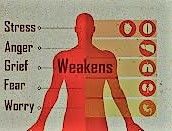Lets discuss what are the main 5 main disadvantages of negative thinking. They say that “you attract what you think” and negative thinking has its way of putting a person into a series of unfavorable consequences, affecting their mental and physical health. There is a growing understanding of the relationship between mind and body. Prolonged negative emotions release stress hormones for a greater period which can result in compromised functioning of vital organs. Negative emotions also affect the quality of life and personality. It also pushes an individual to choose unhealthy coping mechanisms to ease their emotions.
5 Major Disadvantages of Negative Thinking You Need to Know!!!
Lets breakdown 5 most important disadvantage of negative thinking:
Physical health
There is an important relationship between negative thoughts and their potential physiological effects on the body. Negative thoughts awaken the stress response in the body. Prolonged activation of this mechanism leads to cardiovascular issues, disturbance in digestion, sleep disturbances, respiratory problems, hormonal imbalances, tension headaches, and a disabled immune system leading to infection and disease susceptibility.
Mental health
Chronic negative thinking impacts the function and structure of the brain, altering neural pathways, and causing neurotransmitter imbalances. Moreover, it activates the areas in the brain that deal with stress and mental pressure. These intense emotions can overpower individuals and this can further lead to various neurological disorders. It can cause anxiety, depression mood and bipolar disorder, etc. Negative thinking generates a feedback loop of negative emotions and stress.
Stress
Negative thoughts awaken the stress response in the body, which then releases stress hormones. Prolonged activation of this mechanism leads to various health issues. A negative thinking pattern makes the mind fixated on the worst possible outcomes, doubts, and perceived threats. The body undergoes the state of “fight or flight” while compromising the normal body functions to cope with the stressful situation. While continuously staying in stress mode, the never-ending loop starts where the body constantly feels anxious.
Sleep disorders
Stress and anxiety delay mental relaxation and hence not letting the mind relax properly and have a peaceful sleep hindering the transition to relaxing sleep. It causes an imbalance of sleep-cycle-regulating hormones disturbing the body’s natural circadian rhythm. Dwelling on negative emotions and worries can turn into rumination. These repetitive thoughts stop the brain from sleeping peacefully. This also disturbs the healthy sleep cycle and the person finds it difficult to sleep late at night. Such people often suffer from insomnia.
Social isolation
People who are used to negative thinking are mostly socially isolated. Others find it difficult to enjoy their company and make a healthy relationship. Such people also suffer from low self-esteem, social anxiety, behavioral disorders, and decreased motivation. This type of person focuses merely on negative parts of social situations while overlooking neutral or positive aspects. These individuals often isolate themselves to avoid presumed uncomfortable social situations. This can lead to unresolved conflicts and strained relationships.
Lack of motivation
People who tend to think negatively in every situation are generally low on energy and lack motivation. Their behavior is usually self-sabotaging. They do not have any positive ambitions or goals to pursue in life. Even if they have goals, they often abandon them because of self-doubt, possible challenges, and perceived negative outcomes. They find it hard to believe that they can achieve things or that situations can turn out in their favor.
Behavioral issues
People with negative thoughts are generally more furious, frustrated, angry, and sad. This impacts their relationships with friends and family and then often causes uncomfortable situations with strangers as well. they perceive situations in extreme and irrational ways. They don’t just doubt themselves but have difficulty trusting others and doubt other people’s intentions towards them. Hence, most of the time their behavioral responses are inappropriate and their decisions are irrational and impulsive.
Pain perception
Stress hormones released due to negative emotions can intensify an individual’s standard pain tolerance. It also activates regions in the brain that process pain, escalating the brain’s interpretation of pain signals. The individual’s pain sensation increases. Along with that, a negative thinker with preoccupied hurtful emotions focuses more on their pain, which in turn intensifies it. They also get more emotional over it. Their muscles get tensed and stiffer, leading to more pain. Their ability to tolerate pain diminishes as they believe the pain is unbearable.
conclusion
we were explaining what are 5 the disadvantages of negative thinking. Stress hormones, triggered by prolonged negative emotions, compromise vital organs and immune function, developing cardiovascular issues, disrupted digestion, sleep disorders, and more.
It penetrates mental health, reshaping brain structure, and fostering anxiety, depression, and mood disorders. Negative thoughts cause a continuous stress loop, inducing detrimental physiological responses. Sleep disturbances arise as anxiety obstructs relaxation, altering sleep cycles. Social isolation emerges, driven by low self-esteem, social anxiety, and strained relationships. Motivation declines, while behavioral issues and heightened pain perception grows, expanding physical distress.
if you want to read more about this topic; link 1
another one is; link 2
